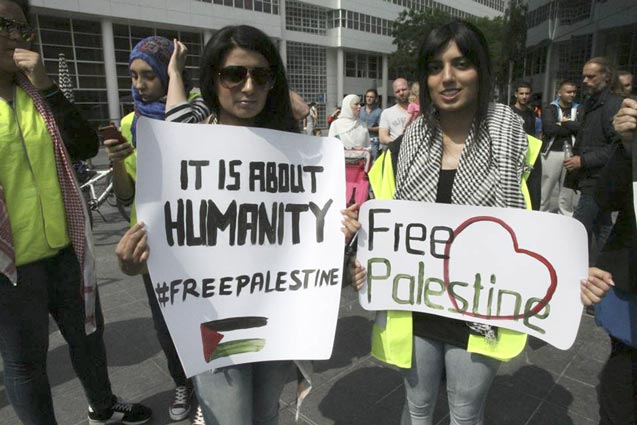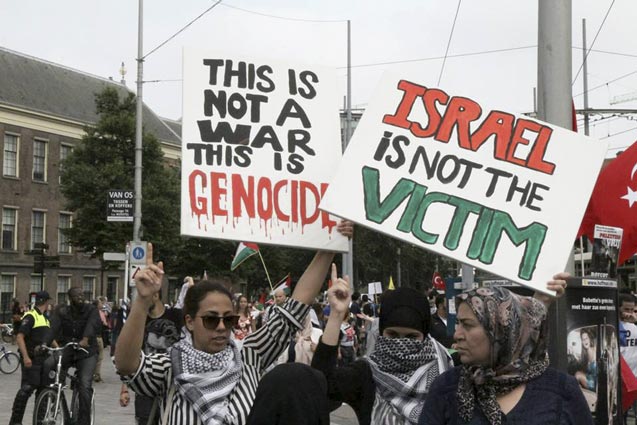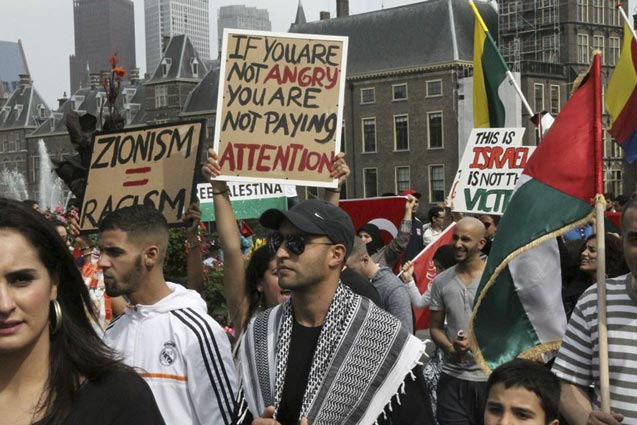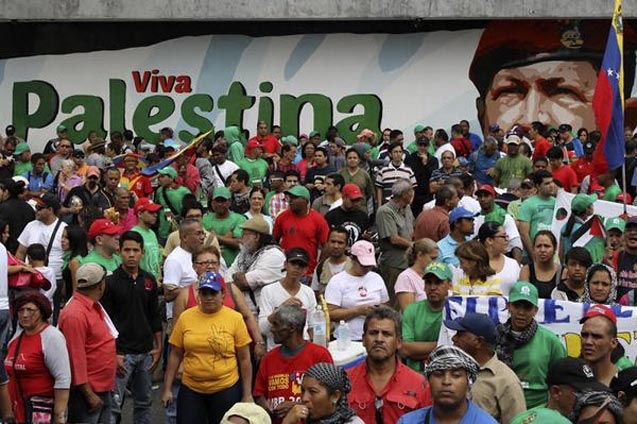
Part of the Series
Gaza on Fire
Support justice-driven, accurate and transparent news — make a quick donation to Truthout today!
As Israel commits genocide in Gaza, Palestine opens up wounds of colonial trauma connecting Third World people in their struggles with racial injustice, colonial occupation and imperial domination across borders. In song and protest, Third World solidarity with Palestine is imagining a de-colonial liberation that makes other worlds possible.
As bombs drop on Gaza yet again, people across the world are turning to the streets in the tens of thousands to express solidarity with the Palestinians. The kind of global protest witnessed today against the ongoing occupation and destruction of native Palestinian life by a western-backed white settler colonial state is far away from being the latest wave of white sentimentality.
Palestine is uniting oppressed communities beyond colonial borders and awakening an urgent need for militancy in interconnected struggles against racial injustice, colonial subjugation and imperial domination. To be in solidarity with Palestine today is to be in revolt against centuries of western global dominance; it is to enact a politics of de-colonial liberation that makes other worlds possible.
From the Ghettos of Palestine to the Ghettos of France
When a pro-Palestinian solidarity march got banned in France last week, protests defiantly went on causing violent clashes between the country’s Arab youth and the state police force. The fire ignited by the events in Gaza and the subsequent protest ban has also been called the beginning of an “intifada”; an uprising linking the silence and complicity of the French government in the systematic genocide of Palestinians with the socioeconomic neglect and dispossession endured by black and brown citizens in France.
The protest ban is a coextension of blind support for Israel by French President Francois Hollande, who, in response to the attacks on Gaza, said that the Israeli government has “the right to take all the measures to protect its population in the face of threats.”
The implicit dehumanization of Palestinians by framing them as “threats” who deserve to be collectively punished and wiped out cannot be delinked from the marking of French Arabs and Muslims as dangers to the nation, who need to be spatially confined to ghettos as well as physically and mentally controlled through police violence, stop and searches, state surveillance and incarceration.
These parallels between Palestine and France are also reflected in the musical collaboration of Nikkifurie, a French Moroccan hip hop artist, and the Palestinian Israeli group, DAM. “My ‘hood is far away from Palestine, but ghettoised just the same by the police,” spits Nikkifurie – emphasizing that the Palestinian condition of dispossession, precarity and exclusion is not an isolated case of systemic violence and injustice, but one that extends to and unites people in liberation struggles “from the ghettos of Palestine to the ghettos of France.”
If the decision to ban the solidarity march was designed to silence and efface such immigrant voices of dissent and deter them from organizing, this tool of repression certainly had a boomerang effect. In outright defying the ban, immigrant youth raised a middle finger to the French state; their collective disobedience revealing that France, in its crimes at home and abroad, holds zero legitimacy in their eyes.
The resurgence of the oppressed through the active reclaiming of the streets and proud assertion of themselves should therefore be understood as a powerful retaliation against the economic, political and cultural wars France wages on its disenfranchised minorities.
Similar dynamics also play out in the Netherlands, where recent Palestinian solidarity marches brought thousands of Dutch Moroccan and Turkish citizens to the streets.
 Protest in the Hague, Netherlands. (Photo: Massalijn)
Protest in the Hague, Netherlands. (Photo: Massalijn)
In their protests, speeches, chants and banners, Dutch immigrant youth refused to swallow the depoliticized and whitewashed version of the televised events in Gaza, taking it upon themselves to ignite the necessary fire of indignation that the injustice perpetrated in Palestine ought to cause. This also implied an engagement in critiques of both domestic and international authorities, institutions and discourses of power.
In his speech, for instance, Dutch Moroccan rapper Appa pushed the public to interrogate and question the hypocrisy of the current global order and the liberal principles of justice that have been accepted as normal: “Where are the champions of morality that came up for gay rights in Russia? Where are all those advocates for children’s rights in Asia and Africa? Where are those politicians that talk plenty about equality and freedom? Where is the so-called honest and objective media? Where are our Arab leaders? Where is that American puppet Sisi that keeps Egypt in stranglehold? Where are all those oil sheikhs that sold their souls to the West? Where are the rest of the hypocrites that shout that they believe in freedom and equality while they are in bed with the Zionist terror state of Israel?”
The banners, chants and speeches that voice their plurality subversive critiques together formed a counter-narrative that relied not on the media or politicians to tell the truth, but on people themselves to tell the truth to each other. For those who share a Third World identity, this also means not relying on white saviors to rescue brown people from their oppression, but understanding that white saviors are the root cause of racial injustice. This could be noticed not only in critiques like that of Appa, but also in how Dutch immigrants took over the city streets.
In the thousands, Dutch Arabs and Muslims repainted an otherwise white, orderly and peaceful urban landscape into a loud messy brown jubilation of people power that blocked off the hyper-consumerist city center. Between the sea of Palestinian flags and the waves of chants like “Israel terrorist, Netanyahu terrorist!” and “Shame on you NOS” [national Dutch news broadcaster], and “Allahu Akbar,” they left the average white Dutch bystander with chills of discomfort.
For second-class citizens who are told they do not belong, that they have no right to speak up and that they must conform to the respectable norms and values of the white Dutch secular middle class if they want to stay and live here, this is a decolonial act. It is a refusal to enact the role of the ‘good assimilated’ immigrant that has abandoned her cultural heritage and pledges eternal gratitude and loyalty to the benevolent Dutch State.
 Protest in the Hague, Netherlands. (Photo: Massalijn)
Protest in the Hague, Netherlands. (Photo: Massalijn)
That day, Palestinian flags were waved, not Dutch ones. That day, the Netherlands was not celebrated, but shamed. That day, Dutch immigrants did not keep their heads down; they raised fists and celebrated presence, public ownership and collective identity in their connection with Palestine.
The Decolonial Turn
It should not come as a surprise that the transnational movement of solidarity with Palestine is emerging most potently and militantly from people of color themselves, since the recognition of Palestinian people’s humanity is necessarily connected to their own. Unlike white people, people who share a Third World identity do not need references to international laws, statistics or UN resolutions to be able to distinguish oppressor from oppressed. Nor do they do need white men like Chomsky, Ben White, Finkelstein or Jimmy Carter to convince them of the grave injustices perpetrated by Israel and its Western allies.
Indeed, it is white people who are yet to be convinced of Palestinians’ humanity, and by extension, that of people of color at large. Third World identity already carries with it the truth, one that finds its roots in a 500-year-long history of subjugation and resistance to the white terror of European colonialism and slavery still strongly experienced today in the shape of racial injustice, Western imperialism and neo-colonialism.
So when Palestinians are being butchered in Gaza, this injustice opens up wounds of colonial trauma and incites an indignation that unites oppressed Third World people globally in their struggles against western domination.
 Solidarity March with Palestine in Venezuela, August 2, 2014. (Photo: Oswaldo Gonzalez)
Solidarity March with Palestine in Venezuela, August 2, 2014. (Photo: Oswaldo Gonzalez)
The recent collaboration between Chillean musician Ana Tijoux and Palestinian artist Shadia Mansour reveals how Palestinian liberation cannot be separated from a broader anti-imperial and anti-colonial struggle of the indigenous “South” against the “gringos” of the “North”: “Get out Yanqui, out of Latin America, the French, English and the Dutch! I want you free, Palestine! We are Africans, Latin-Americans! We are this South and together we join hands! This is not utopia; it’s rebellious jubilation!”
With Palestine at the center of transnational de-colonial struggle, Third World protests and transnational musical alliances are imagining a new global community of belonging beyond colonial borders that works to reclaim our own destinies and restore the humanity of the oppressed, not by meeting racist eurocentric notions of the human, but by transforming colonial shame into de-colonial pride through intersecting struggles of liberation from Palestine to Puerto Rico.
In so doing, activists and artists are generating alternative ways of seeing and knowing the world that reject the colonial paradigm, which conceives of life as exploitable and disposable while carving a space that “de-colonizes what we were taught” and “celebrates,” in the words of Ana Tijoux, “our black hair, our high cheekbones.”
With Third World people leading the Palestinian transnational solidarity movement, their critiques and revolts against the global order are pushing people to move beyond the liberal framework of human rights, international law and UN conventions as a means to end the ongoing destruction of Palestinian lives. As Palestine lays bare the Western power interests these international mechanisms serve, people across the world are emancipating from worshiping the Western world and international diplomacy as divine upholders of liberty and freedom, urging them instead to reclaim themselves as actors of radical change and transformation, not only for the Palestinians, but for Third World people everywhere.
It’s this process of change that opens up a de-colonial future that make other worlds possible, because “above all,” as French Algerian activist Houria Bouteldja says, “the de-colonial person is the one that has defeated his or her fascination for the White Man and for Western civilization.”
Media that fights fascism
Truthout is funded almost entirely by readers — that’s why we can speak truth to power and cut against the mainstream narrative. But independent journalists at Truthout face mounting political repression under Trump.
We rely on your support to survive McCarthyist censorship. Please make a tax-deductible one-time or monthly donation.